Like many workers worldwide, I’ve been stuck between jobs during this coronavirus epidemic. In many ways, it’s been a welcome break. I now have time to work on projects that have been on the back burner for years. Like this blog. But knowing myself as I do, I will eventually need to find work to keep from going crazy, and I’ve certainly been thinking about future career directions.
Having a sitting disability does set boundaries on the realm of possibilities. (I do not think I will be a long-haul trucker, or a traveling salesperson.) I was curious about how others in the same boat have navigated workplace challenges. What sorts of jobs do people get? Are they traveling to get there? Are there any accommodations that are particularly helpful?
To answer these questions, I created a survey, which I shared on the Sitting Disabilities Facebook group on June 14th. Respondents had all previously identified as having a sitting disability, and joined an online support group, which would indicate that sitting disabilities have already had a significant impact on their lives. After a week, I collected the results, and summarize them here.
Survey Results
I received 12 responses. (Not a huge number, to be sure. So, grain of salt, I can’t be sure that the answers here would be consistent with trends from a larger population.) Of those, 2 respondents were currently working, 9 were not currently working, and 1 was retired.

One surprising result I found was that, of the 10 respondents who were not currently working, 100% said their work status was related to their disability. Granted, survey respondents were a self-selected group, but still, I was not prepared for the unanimous conclusion. Rarely do I see 100% of people agree on anything. I am almost certain that, if I asked 10 random people, “Do you want cancer?” at least one would say yes.
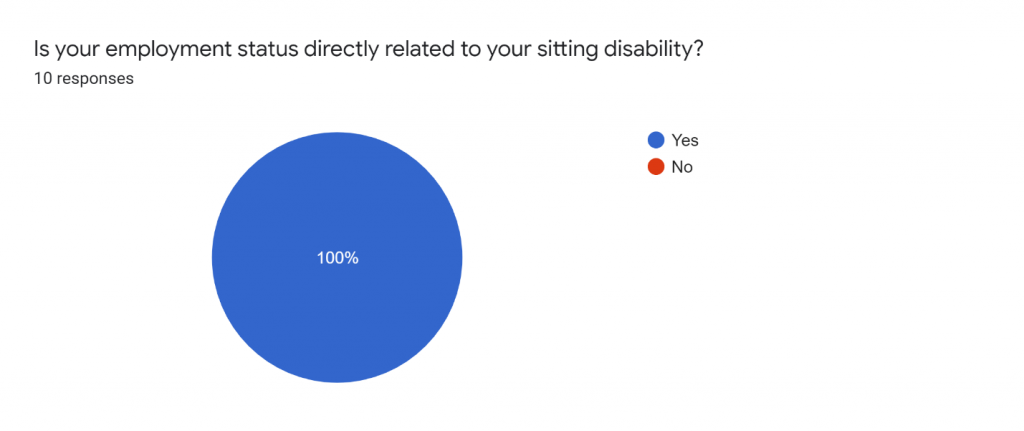
Though the survey didn’t ask about this specifically, the responses make it clear that postural and transportation requirements of holding a job severely limits the opportunities for the sitting disabled. One respondent who does not currently work wrote, “I was no longer able to be an accountant when I wasn’t able to sit for hours at a time.” Another reported that, “I was made redundant nearly 6 years ago and haven’t worked since. I used to lay down in my last job but trying to find a new job where I can do this is very hard.”
Interestingly, both working respondents reported that they worked from home.
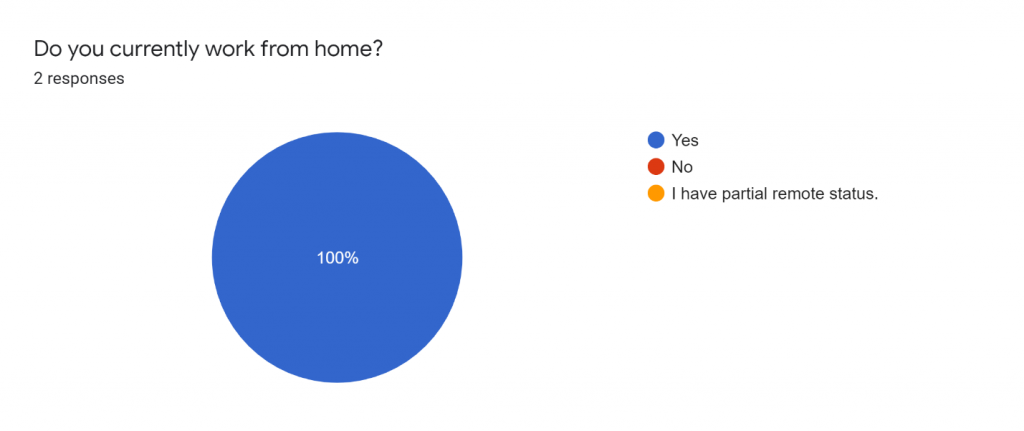
Though it would be unwise to draw sweeping conclusions based off such a small sample size, I did note that both working respondents noted their limited workplace options.
What impact has your sitting disability had on your career choice or prospects?
- I can’t work in an office or somewhere that I have to stand for too long or sit or lift things. It’s extremely limiting.
- I had to find a job where I would be able to work from home
I finally saw a divided response when I asked the working respondents whether their employer was aware of their sitting disability. There was one vote for “Yes,” and one vote for “No.”
Encouragingly, both working respondents reported that their employers were willing to chip in for appropriate workstations. In one case, this meant the employer gave everyone worker from home a monetary allowance. The other employer voiced their willingness to provide any accessories that might be useful.
Demographics
There was a good span of ages represented, although the survey respondents did skew older. All but 2 were over 40.
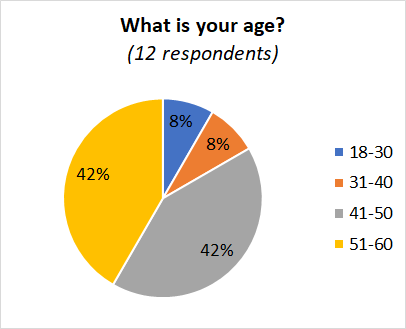
Respondents were predominantly female.
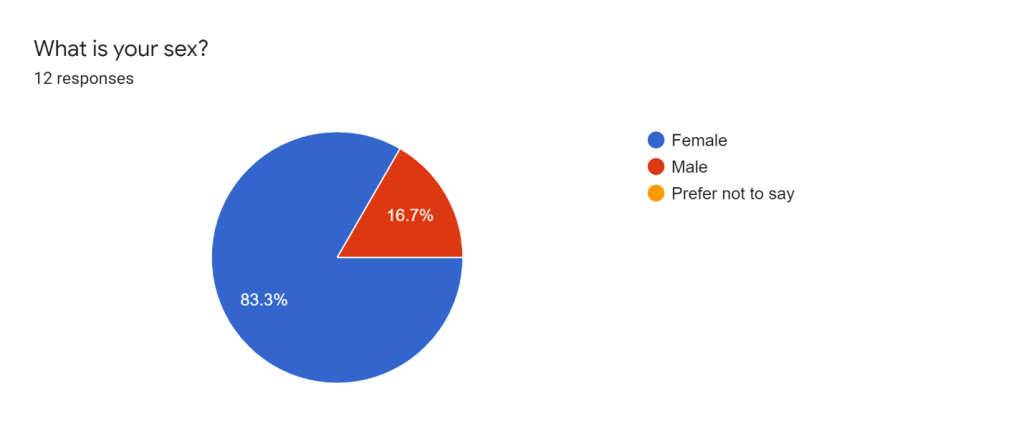
Nearly all respondents were from English-speaking countries, which is not surprising, given that both the Facebook group and the survey are in English. Otherwise, respondents were fairly well distributed.
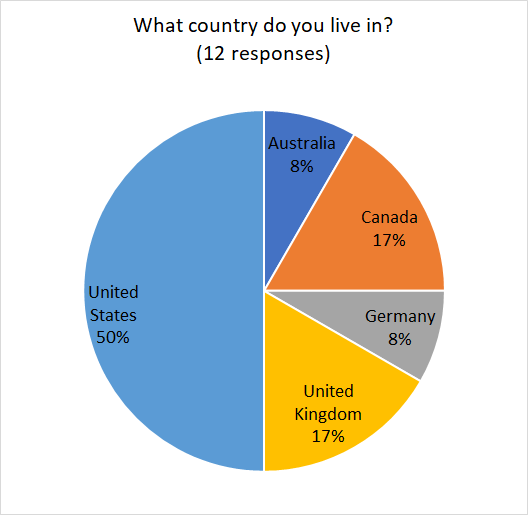
Conclusions
Clearly, there are serious obstacles to finding and holding a job when you have a sitting disability. The demands of a person’s workplace or occupation may not be suitable once a sitting disability develops. There are not many traditional jobs that encourage a worker to lay down for long stretches of time. And given the hazards of standing all day, regular reclining would seem to be necessary.
Working from home seems to be the most workable option, but gainful opportunities are not as plentiful as one might hope. Will the current coronavirus situation, which has led to a short-term increase in remote work, lead to a proliferation of remote positions? I have my fingers crossed, but it will take some time before we know for sure.
Unfortunately, it seems that many workers, including those who did not wish to stop working, did not have a clear path to either transition into a new career, or out of the workforce. Some were able to work part-time, or on an occasional contract basis, some were able to successfully file for disability (although that is a job in itself), and at least one was forced to take early retirement. One respondent was forced into a precarious position when layoffs eliminated their position. They were not eligible for any government assistance, and poor health prohibited them from finding other work.
I was looking for takeaways for my own job search, and I concluded that:
- A remote position is most amenable for those with sitting disabilities.
- If office time is required, there must be a way for me to regularly recline.
- Some flexibility in the schedule is a plus, since some days are better than others.
If I were taking the perspective of either an employer or a government official, I would note that there is a significant amount of talent that is being wasted because the workplaces are not suitable for the employees. If remote work would allow people to put their experience and talents to productive use, then that seems like a low-cost, reasonable accommodation.
It remains to be seen whether actual employers or governments will agree with me.
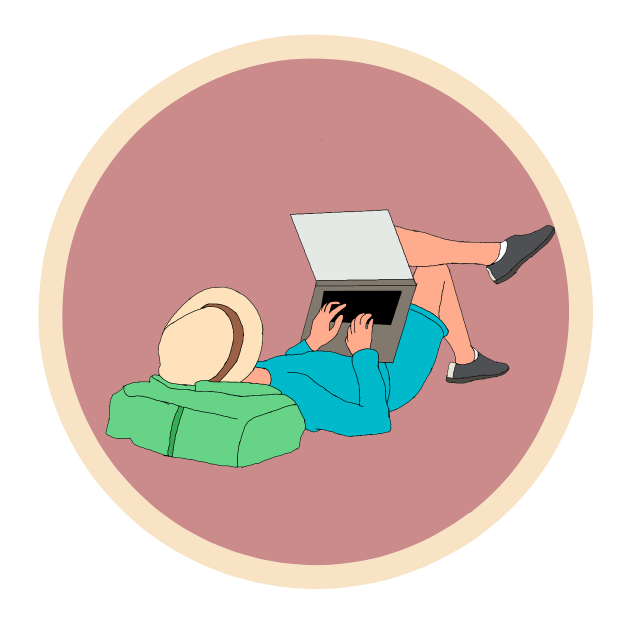
2 thoughts on “Working With a Sitting Disability Survey Results”